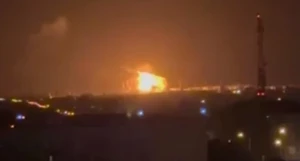
China plays with marked cards
Not even a month has passed since Xi Jinping and Putin promised each other to deepen bilateral relations
While the world is studying with great interest Beijing's plan for a 'Ukrainian settlement' and experts are racing to find out the true motives of 'Uncle Xi', the Chinese government has embarked on a real revolution of place names. And we are talking about the names of settlements and territories that, surprisingly, still belong to the 'ally' and 'great partner' – Russia. Yes, they historically belonged to China, but is it really surprising in today's world that there is a sincere desire to regain 'unjustified gifts' (Putin)?
Thus, on February 14, 2023, the Chinese Ministry of Environment published a list of such 'souvenirs' on the government portal as part of paragraph 14 on changing publicly available geographical maps of the PRC. It is about adding authentic Chinese names to the names of the cities of Vladivostok (Haishenwai), Ussuriysk (Shuangchengji), Khabarovsk (Boli), Blagoveshchensk (Hailanbao), Sakhalin Island (Kuedao), Nerchinsk (Nibuchu), Nikolaevsk-on-Amur (Miaojie), and Stanovoy Range (Wai Xīng'an Ling). This is so that the local residents, who are still formal 'Russians', gradually get used to the new place names, and do not break their jaws pronouncing them when Chinese flags fly there.
An interesting thing: did the Kremlin bunker old man think about the Pandora's box he was opening by invading Ukraine? Did Moscow's strategists think that it was the Russian Federation that could become a target of its neighbors' territorial encroachments? In reality, along Russia's current borders are the 'legacies' of past wars of aggression and illegal annexations.
“Did the Kremlin bunker old man think about the Pandora's box he was opening by invading Ukraine? Did Moscow's strategists think that it was the Russian Federation that could become a target of its neighbors' territorial encroachments? In reality, along Russia's current borders are the 'legacies' of past wars of aggression and illegal annexations.”
Beijing plays with marked cards even on geographical maps. As soon as the 'Chinese peace plan' was supported in Kazakhstan, a Russian diplomatic force immediately landed there, smelling trouble. For Astana, it is clear that China is the guarantor of Moscow's encroachments, and the recent example of the participation of CSTO 'partners' in curbing the anti-Tokayev rebellion left a rather unpleasant aftertaste. Although I, for one, would not dare to consider Beijing a one hundred percent panacea. What if the ministry of natural resources of the communist empire wants to publish a list of Kazakh settlements with 'historical names'?
I should note that the timing of the paper claims against Russia was chosen in a rather cynical way. After all, it was in the Chinese government offices that the '12 points of peace in Ukraine' were born, the first and, one would think, fundamental one, which reads as follows: “Respect for the sovereignty of all countries.”
Moreover, not even a month has passed since Xi Jinping and Putin promised each other to deepen bilateral relations. However, this does not prevent Beijing officials from saying in private conversations with Western media that “Putin has gone mad. The decision to invade was made by a very small group of people. China should not just follow Russia's lead.”
“Not even a month has passed since Xi Jinping and Putin promised each other to deepen bilateral relations. However, this does not prevent Beijing officials from saying in private conversations with Western media that “Putin has gone mad. The decision to invade was made by a very small group of people. China should not just follow Russia's lead.”
In the case of place names, you know, I do not disagree with Russia's sovereignty at all. Quite the contrary. Especially since China's creeping annexation of the Russian Far East and Siberia has been going on for quite some time. But for the sake of credibility in its own 'peacekeeping efforts', it would be better to refrain from such openly expansionist documents.
Beijing has long realized that Putin's Russia is an idol on clay feet that would have fallen without the bloody adventure in Ukraine. And Moscow seems to have accepted the shameful role of 'junior partner' for the Chinese. They have accepted it not because of the good life, but because Putin and his gang are sorely lacking weapons and other resources to continue the failed 'special military operation'. And the sanctions of the civilized world are forcing Moscow to look for markets for its energy carriers in order to earn at least a penny to feed its military Moloch (a bull-headed idol with outstretched hands over a fire. Moloch has been figuratively used in reference to a person or a thing which demands or requires a very costly sacrifice – ed.).
Significantly, Belarusian dictator Lukashenko has also turned his gaze eastward, paying an official visit to Beijing. It seems that, sensing the approach of the Russian catastrophe, he is looking for a backup lifeline to stay in power. Luka obviously does not want to get directly involved in a lost war on the side of the loser and the defeated. And the Belarusian collective farm chairman is not used to living without a powerful sovereign, and he does not know how to…
Therefore, 'Uncle Xi' can play with the marked geographical maps without any reservations, renaming as many Russian territories and cities as he likes. After all, sooner or later they will fall under the feet of the Chinese Mandarin like ripe pears. Unless, of course, the indigenous peoples of those territories continue to accept the rule of another occupier.
About the author. Ihor Hulyk, journalist, editor-in-chief of the Espreso.West website.
The editors do not always share the opinions expressed by the authors of the blogs.
- News














































